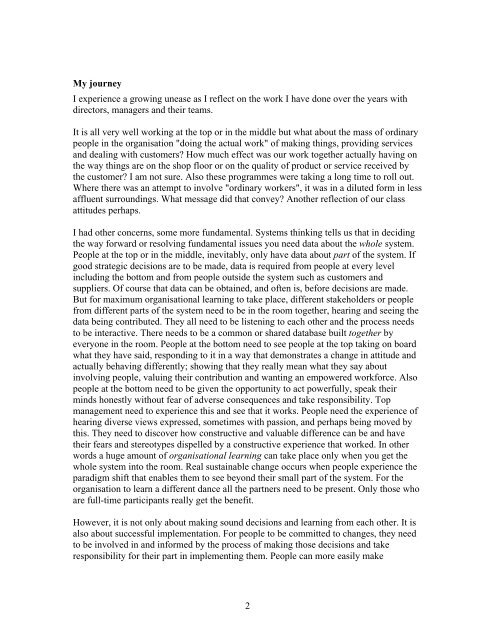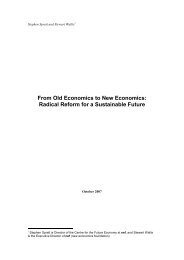Creating the futures we desire - getting the whole ... - Bruce Nixon
Creating the futures we desire - getting the whole ... - Bruce Nixon
Creating the futures we desire - getting the whole ... - Bruce Nixon
You also want an ePaper? Increase the reach of your titles
YUMPU automatically turns print PDFs into web optimized ePapers that Google loves.
My journey<br />
I experience a growing unease as I reflect on <strong>the</strong> work I have done over <strong>the</strong> years with<br />
directors, managers and <strong>the</strong>ir teams.<br />
It is all very <strong>we</strong>ll working at <strong>the</strong> top or in <strong>the</strong> middle but what about <strong>the</strong> mass of ordinary<br />
people in <strong>the</strong> organisation "doing <strong>the</strong> actual work" of making things, providing services<br />
and dealing with customers How much effect was our work toge<strong>the</strong>r actually having on<br />
<strong>the</strong> way things are on <strong>the</strong> shop floor or on <strong>the</strong> quality of product or service received by<br />
<strong>the</strong> customer I am not sure. Also <strong>the</strong>se programmes <strong>we</strong>re taking a long time to roll out.<br />
Where <strong>the</strong>re was an attempt to involve "ordinary workers", it was in a diluted form in less<br />
affluent surroundings. What message did that convey Ano<strong>the</strong>r reflection of our class<br />
attitudes perhaps.<br />
I had o<strong>the</strong>r concerns, some more fundamental. Systems thinking tells us that in deciding<br />
<strong>the</strong> way forward or resolving fundamental issues you need data about <strong>the</strong> <strong>whole</strong> system.<br />
People at <strong>the</strong> top or in <strong>the</strong> middle, inevitably, only have data about part of <strong>the</strong> system. If<br />
good strategic decisions are to be made, data is required from people at every level<br />
including <strong>the</strong> bottom and from people outside <strong>the</strong> system such as customers and<br />
suppliers. Of course that data can be obtained, and often is, before decisions are made.<br />
But for maximum organisational learning to take place, different stakeholders or people<br />
from different parts of <strong>the</strong> system need to be in <strong>the</strong> room toge<strong>the</strong>r, hearing and seeing <strong>the</strong><br />
data being contributed. They all need to be listening to each o<strong>the</strong>r and <strong>the</strong> process needs<br />
to be interactive. There needs to be a common or shared database built toge<strong>the</strong>r by<br />
everyone in <strong>the</strong> room. People at <strong>the</strong> bottom need to see people at <strong>the</strong> top taking on board<br />
what <strong>the</strong>y have said, responding to it in a way that demonstrates a change in attitude and<br />
actually behaving differently; showing that <strong>the</strong>y really mean what <strong>the</strong>y say about<br />
involving people, valuing <strong>the</strong>ir contribution and wanting an empo<strong>we</strong>red workforce. Also<br />
people at <strong>the</strong> bottom need to be given <strong>the</strong> opportunity to act po<strong>we</strong>rfully, speak <strong>the</strong>ir<br />
minds honestly without fear of adverse consequences and take responsibility. Top<br />
management need to experience this and see that it works. People need <strong>the</strong> experience of<br />
hearing diverse views expressed, sometimes with passion, and perhaps being moved by<br />
this. They need to discover how constructive and valuable difference can be and have<br />
<strong>the</strong>ir fears and stereotypes dispelled by a constructive experience that worked. In o<strong>the</strong>r<br />
words a huge amount of organisational learning can take place only when you get <strong>the</strong><br />
<strong>whole</strong> system into <strong>the</strong> room. Real sustainable change occurs when people experience <strong>the</strong><br />
paradigm shift that enables <strong>the</strong>m to see beyond <strong>the</strong>ir small part of <strong>the</strong> system. For <strong>the</strong><br />
organisation to learn a different dance all <strong>the</strong> partners need to be present. Only those who<br />
are full-time participants really get <strong>the</strong> benefit.<br />
Ho<strong>we</strong>ver, it is not only about making sound decisions and learning from each o<strong>the</strong>r. It is<br />
also about successful implementation. For people to be committed to changes, <strong>the</strong>y need<br />
to be involved in and informed by <strong>the</strong> process of making those decisions and take<br />
responsibility for <strong>the</strong>ir part in implementing <strong>the</strong>m. People can more easily make<br />
2



